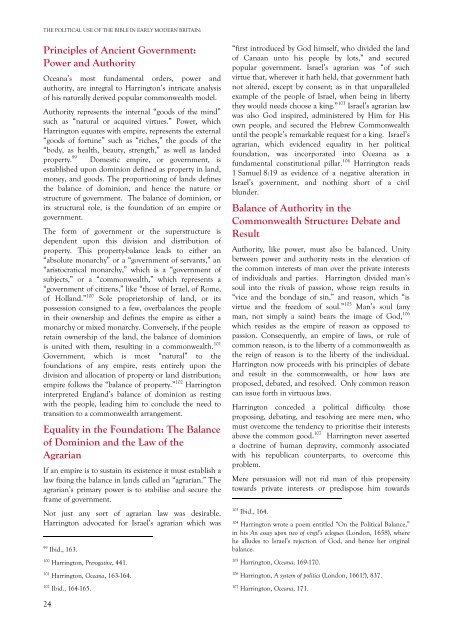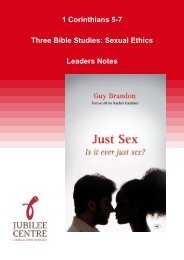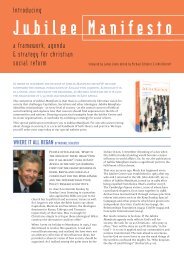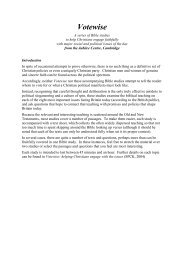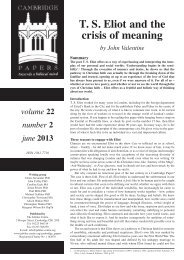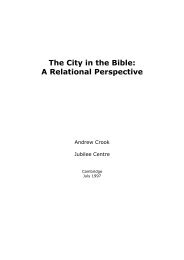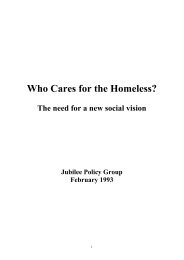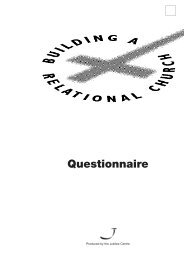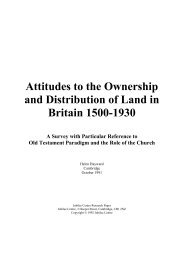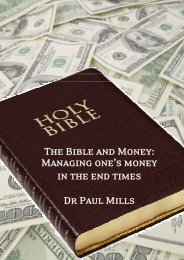Report Template - Jubilee Centre
Report Template - Jubilee Centre
Report Template - Jubilee Centre
Create successful ePaper yourself
Turn your PDF publications into a flip-book with our unique Google optimized e-Paper software.
THE POLITICAL USE OF THE BIBLE IN EARLY MODERN BRITAIN:<br />
Principles of Ancient Government:<br />
Power and Authority<br />
Oceana’s most fundamental orders, power and<br />
authority, are integral to Harrington’s intricate analysis<br />
of his naturally derived popular commonwealth model.<br />
Authority represents the internal “goods of the mind”<br />
such as “natural or acquired virtues.” Power, which<br />
Harrington equates with empire, represents the external<br />
“goods of fortune” such as “riches,” the goods of the<br />
“body, as health, beauty, strength,” as well as landed<br />
property. 99 Domestic empire, or government, is<br />
established upon dominion defined as property in land,<br />
money, and goods. The proportioning of lands defines<br />
the balance of dominion, and hence the nature or<br />
structure of government. The balance of dominion, or<br />
its structural role, is the foundation of an empire or<br />
government.<br />
The form of government or the superstructure is<br />
dependent upon this division and distribution of<br />
property. This property-balance leads to either an<br />
“absolute monarchy” or a “government of servants,” an<br />
“aristocratical monarchy,” which is a “government of<br />
subjects,” or a “commonwealth,” which represents a<br />
“government of citizens,” like “those of Israel, of Rome,<br />
of Holland.” 100 Sole proprietorship of land, or its<br />
possession consigned to a few, overbalances the people<br />
in their ownership and defines the empire as either a<br />
monarchy or mixed monarchy. Conversely, if the people<br />
retain ownership of the land, the balance of dominion<br />
is united with them, resulting in a commonwealth. 101<br />
Government, which is most “natural” to the<br />
foundations of any empire, rests entirely upon the<br />
division and allocation of property or land distribution;<br />
empire follows the “balance of property.” 102 Harrington<br />
interpreted England’s balance of dominion as resting<br />
with the people, leading him to conclude the need to<br />
transition to a commonwealth arrangement.<br />
Equality in the Foundation: The Balance<br />
of Dominion and the Law of the<br />
Agrarian<br />
If an empire is to sustain its existence it must establish a<br />
law fixing the balance in lands called an “agrarian.” The<br />
agrarian’s primary power is to stabilise and secure the<br />
frame of government.<br />
Not just any sort of agrarian law was desirable.<br />
Harrington advocated for Israel’s agrarian which was<br />
99<br />
Ibid., 163.<br />
100<br />
Harrington, Prerogative, 441.<br />
101<br />
Harrington, Oceana, 163-164.<br />
102<br />
Ibid., 164-165.<br />
“first introduced by God himself, who divided the land<br />
of Canaan unto his people by lots,” and secured<br />
popular government. Israel’s agrarian was “of such<br />
virtue that, wherever it hath held, that government hath<br />
not altered, except by consent; as in that unparalleled<br />
example of the people of Israel, when being in liberty<br />
they would needs choose a king.” 103 Israel’s agrarian law<br />
was also God inspired, administered by Him for His<br />
own people, and secured the Hebrew Commonwealth<br />
until the people’s remarkable request for a king. Israel’s<br />
agrarian, which evidenced equality in her political<br />
foundation, was incorporated into Oceana as a<br />
fundamental constitutional pillar. 104 Harrington reads<br />
1 Samuel 8:19 as evidence of a negative alteration in<br />
Israel’s government, and nothing short of a civil<br />
blunder.<br />
Balance of Authority in the<br />
Commonwealth Structure: Debate and<br />
Result<br />
Authority, like power, must also be balanced. Unity<br />
between power and authority rests in the elevation of<br />
the common interests of man over the private interests<br />
of individuals and parties. Harrington divided man’s<br />
soul into the rivals of passion, whose reign results in<br />
“vice and the bondage of sin,” and reason, which “is<br />
virtue and the freedom of soul.” 105 Man’s soul (any<br />
man, not simply a saint) bears the image of God, 106<br />
which resides as the empire of reason as opposed to<br />
passion. Consequently, an empire of laws, or rule of<br />
common reason, is to the liberty of a commonwealth as<br />
the reign of reason is to the liberty of the individual.<br />
Harrington now proceeds with his principles of debate<br />
and result in the commonwealth, or how laws are<br />
proposed, debated, and resolved. Only common reason<br />
can issue forth in virtuous laws.<br />
Harrington conceded a political difficulty: those<br />
proposing, debating, and resolving are mere men, who<br />
must overcome the tendency to prioritise their interests<br />
above the common good. 107 Harrington never asserted<br />
a doctrine of human depravity, commonly associated<br />
with his republican counterparts, to overcome this<br />
problem.<br />
Mere persuasion will not rid man of this propensity<br />
towards private interests or predispose him towards<br />
103<br />
Ibid., 164.<br />
104<br />
Harrington wrote a poem entitled “On the Political Balance,”<br />
in his An essay upon two of virgil’s eclogues (London, 1658), where<br />
he alludes to Israel’s rejection of God, and hence her original<br />
balance.<br />
105<br />
Harrington, Oceana, 169-170.<br />
106<br />
Harrington, A system of politics (London, 1661?), 837.<br />
107<br />
Harrington, Oceana, 171.<br />
24


